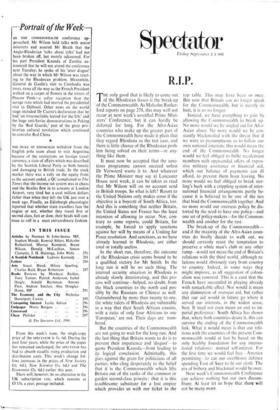RIP.
It must now be accepted that the sanc- tions programme cannot succeed unless Dr Verwoerd wants it to. And whatever the Prime Minister may say at Lancaster House next week, it can be taken as read that Mr Wilson will on no account send in British troops. So what is left? Resort to the United Nations only makes sense if the objective is a boycott of South Africa, too. And this is something that neither Britain, the United States nor France has the least intention of allowing to occur. Nor, con- trary to some reports, could Britain, for example, be forced to apply sanctions against her will by means of a Uniting for Peace resolution. And sanctions, as we have already learned in Rhodesia, are either total or totally useless.
In the short run, therefore, the outcome of the Rhodesian crisis seems bound to be a qualified victory for Mr Smith. In the long run it will be no such thing. The internal security situation in Rhodesia is already slowly deteriorating, and this pro- cess will continue—helped, no doubt, from the black countries to the north and pos- sibly by the Russians or Chinese as well. Outnumbered by more than twenty to one, the white rulers of Rhodesia are vulnerable in a way that their South African cousins, with a ratio of only four Africans to one 'European,' are not. Their days are num- bered.
But the countries of the Commonwealth are not going to wait for the long run. And the last thing that Britain wants to do is to prevent their impatience and 'disgust'—to quote President Kaunda—from leading to its logical conclusion. Admittedly, this • goes against the grain for politicians of all parties, who cling desperately to the belief that it is the Commonwealth which lifts Britain out of the ranks of the common or garden second-class powers: that it is this troublesome substitute for a lost empire which provides us with our ticket to the top table. This may have been so once. But now that Britain can no longer speak for the Commonwealth, but is merely its butt, it is so no longer.
Instead, we have everything to gain by allowing the Commonwealth to break up. No more would we be singled out for Afro- Asian abuse. No more would we be con- stantly blackmailed with the threat that if we were so presumptuous as to follow our own national interests, this would mean the end of the Commonwealth. No longer would we feel obliged to bribe recalcitrant members with open-ended offers of expen- sive military assistance or financial aid, which our balance of payments can ill afford, to prevent them from leaving. No more would we feel obliged to break ster- ling's back with a crippling system of inter- national financial arrangements partly be- cause it is believed to be one of the ties that bind the Commonwealth together. And no more would our overseas policy be dis- torted by the need to have one policy—and one set of policy-makers—for the Common- wealth and another for the rest.
The break-up of the Commonwealth— and if the majority of the Afro-Asian coun- tries do finally decide to walk out, we should certainly resist the temptation to preserve a white man's club or any other rump—would not mean the end of Britain's relations with the third world, although re- lations would obviously vary from country to country. Indeed, in some ways they might improve, as all suggestion of coloni- alism was removed. This is a card that the French have succeeded in playing already with remarkable effect. Nor would it mean any diminution of overseas aid, but rather that our aid would in future go where it served our interests, in the widest sense, best. It need not even mean an end to im- perial preference: South Africa has shown that, where both countries desire it, this can survive the ending of the Commonwealth link. What it would mean is that our rela- tions with the countries of the present Com- monwealth would at last be based on the only healthy foundation for any interna- tional relations : mutual self-interest. For the first time we would feel free—America permitting--to cut our overblown defence spending East of Suez to fit our cloth. The era of bribery and blackmail would be over.
Next week's Commonwealth Conference can achieve nothing but our own discom- fiture. At least let us hope that there will not be many more.






























 Previous page
Previous page